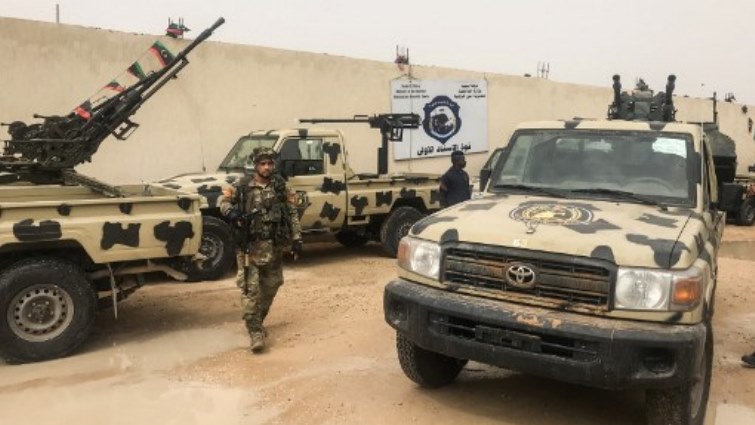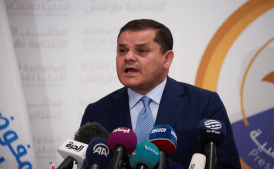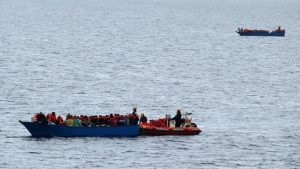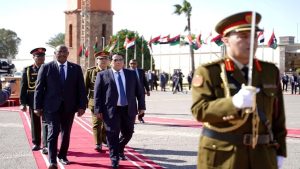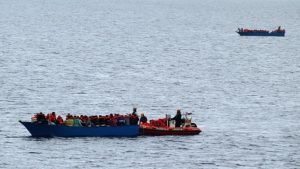Armed clashes broke out Friday south of Libya’s capital Tripoli between a pro-government alliance and forces loyal to eastern strongman Khalifa Haftar, sources on both sides said.
A unity government source said the fighting struck regions less than 50 kilometres (30 miles) south of the capital.
The press office of Haftar’s force said there had been “violent fighting on the edge of Tripoli with armed militias”.

Libya: advances by Libya’s Haftar over five years
Libyan commander Khalifa Haftar, whose forces were pushed back Friday as they made a lightning advance on Tripoli, has over the past five years conquered northeastern Libya and much of the south.
After the ouster and killing of longtime dictator Moamer Kadhafi in 2011, Libya plunged into chaos with a multitude of militias vying for control of the oil-rich country.
It now has an internationally recognised unity government in Tripoli and a parallel administration, backed by Haftar, based in the east.
Here is a look back at Haftar’s ascendance:
– Operation Dignity –
In May 2014 Haftar, a retired general who had taken part in the revolt against the Kadhafi regime, unleashes an offensive dubbed “Operation Dignity” to purge Libya of Islamists he brands “terrorists”.
Several officers from the eastern region, including the air force, join his self-proclaimed Libyan National Army (LNA).
Their operation is not successful. Forces loyal to Haftar are driven out of the second city Benghazi in the east which falls into the hands of Islamist militias.
In October Haftar’s forces launch an new offensive on Benghazi.
– Al-Jufra –
In May 2017 Haftar’s forces seize the Tamenhant military base near Sebha in the south, after driving out a militia loyal to the Tripoli-based Government of National Accord (GNA).
In early June they seize Al-Jufra air base 500 kilometres (310 miles) south of Tripoli and take the nearby towns of Houn and Soukna.
With these new advances, forces loyal to Haftar control the important towns and military bases in Libya’s southern desert.
The United Nations says in a report that the United Arab Emirates has supplied military equipment to the Libyan National Army, breaching a UN arms embargo.
– Benghazi, Derna –
In July, Haftar announces his forces have pushed hardline militias out of Benghazi.
He had support from neighbouring Egypt, as well as the United Arab Emirates, before seeking help from Russia in early 2017.
France welcomes Haftar’s advance in Benghazi on July 6 and three days later the strongman visits Abu Dhabi.
On October 1 Benghazi’s commercial port reopens after being out of action for three years.
Haftar then quickly launches a successful operation to oust Islamist militias from the city of Derna, which had been the only part of eastern Libya out of his control.
– Conquering the south –
Capitalising on that success, his forces in January 2019 launch a new offensive into the oil-rich desert south, ostensibly aimed at wiping out “terrorists” and criminal groups.
His forces seize the region’s capital Sebha, 650 kilometres south of Tripoli, and one of the country’s main oil fields, Al-Sharara, without a fight.
The field normally produces 315,000 barrels of crude per day — nearly a third of Libya’s overall output — but had been shut down for nearly two months by armed groups.
In February the LNA says it has peacefully taken control of the Al-Fil field, also in the south.
– Towards Tripoli –
On April 3, 2019 the LNA’s spokesman announces Haftar’s forces are gearing up to move on the west of the country including Tripoli.
A day later Haftar orders his forces to advance on the capital.
Unity government chief Fayez al-Sarraj says he has ordered loyalist forces to prepare to “face all threats”.
On April 5, Haftar’s forces are pushed back from a key checkpoint less than 30 kilometres from Tripoli.
After meeting Haftar, UN chief Antonio Guterres expresses concern about the situation, saying in a statement: “I still hope it will be possible to avoid a bloody confrontation in and around Tripoli.”


